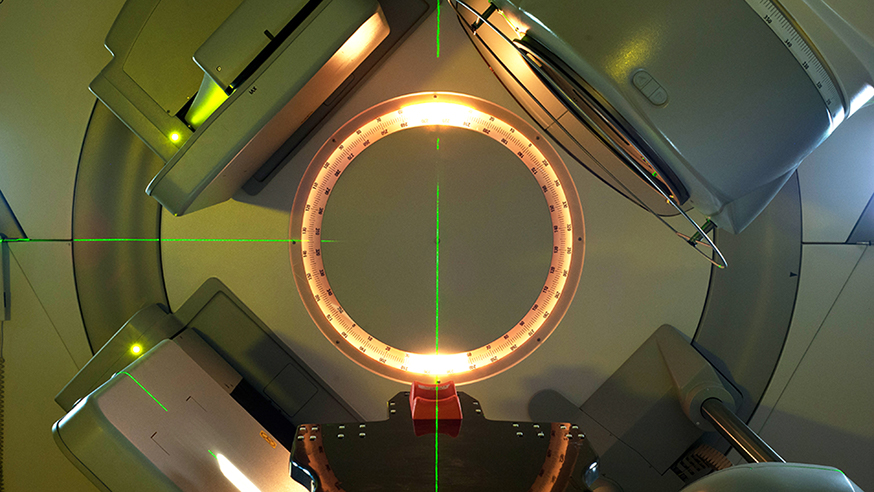
Given its 100-year history, you might be forgiven for thinking of radiotherapy as archaic, old-fashioned, out-of-date.
But you couldn’t be further from the truth.
More than 120,000 cancer patients in the UK are treated with radiotherapy each year and the technique continues to cure more people than all existing drugs combined.
Although the principle has remained the same through history – using radiation to damage DNA and kill cancer cells – the mode of delivery has become much more sophisticated over recent decades.
We founded our department of radiotherapy in the early 1940s and have been pioneers in developing the technology, at the forefront of some of the biggest developments that have improved patient care.
Our research into ways to target delivery of radiotherapy precisely to tumours has helped increase the effectiveness of radiation treatments, leading to changes in clinical practice, reduced treatment complications and improved cure rates.
Intensity modulated radiotherapy
Along with our hospital partner The Royal Marsden, we pioneered intensity modulated radiotherapy (IMRT). This high-precision method enables the X-ray beam used in radiotherapy to be adjusted, changing beam shape and intensity as the machine moves around the body, to match the shape of the tumour. This spares the surrounding tissue, and allows higher intensities of radiation to be concentrated on the tumour.
Our researchers have shown that this technique reduces the severity of side-effects in many cancers – such as Professor Kevin Harrington’s research into avoiding dry mouth in patients treated for head and neck cancers, or Professor David Dearnaley’s work to reduce bowel, bladder and sexual side-effects in prostate cancer patients.
We have also shown that the technique is suitable for elderly patients with bladder cancer.
Image-guided radiotherapy
Advances in the imaging of cancer using scanning techniques allowed the ICR and The Royal Marsden to extend the potential of IMRT by combining diagnostics and therapeutics in a new technique, known as image-guided radiotherapy (IGRT).
This allows the radiation beam to be adjusted based on feedback from a scanner that monitors patients in real time.
The technique can accommodate for movement of tumours in the body as a patient moves, protecting surrounding tissue even more effectively.
The MR Linac – a UK-first set to revolutionise radiotherapy
The ‘daddy’ of image-guided radiotherapy, the MR Linac, combines two technologies – an MRI scanner and a linear accelerator.
This means we will be able to precisely locate and dose even moving tumours – such those of the lung, affected by breathing, or a prostate tumour that might move from day-to-day depending on what the person has eaten and how full their bowel is.
The ICR and The Royal Marsden are the first in the UK to receive the multimillion pound machine, which is due to be up and running, and ready to treat patients in 2018.
Reducing side effects of breast cancer radiotherapy
Professor Judith Bliss, Director of the ICR’s Clinical Trials and Statistics Unit, and Professor John Yarnold led a study to reduce side effects from radiotherapy for breast cancer.
The IMPORT LOW trial, involving more than 2,000 women, demonstrated that postoperative radiotherapy focused only around the part of the breast that had contained the tumour has fewer long-term side effects and is just as effective as standard whole-breast radiotherapy.
The researchers hope the study will contribute to a change in clinical practice in the very near future.
Less is more for early breast cancers
Our work hasn’t just focused on precision targeting. We’ve also been looking at refining the doses of radiotherapy needed to kill cancer cells.
The START clinical trial, led by Professors Judith Bliss and John Yarnold, found that three weeks of radiotherapy is as good as five weeks for treating breast cancer – as well as being more convenient and less tiring for patients.
It has also had the added benefit of being cheaper for the health service, saving the NHS around £50 million per year since 2009.
Better for patients, better for the NHS
Professor David Dearnaley led a practice-changing clinical trial that found a shorter course of prostate cancer radiotherapy, involving 17 fewer hospital visits and higher individual doses of radiotherapy, is as effective as the current standard treatment for both survival and quality of life – and could save the NHS tens of millions of pounds per year.
Could gut bacteria dictate how people respond to radiotherapy?
Our researchers have begun the first study to look scientifically at the influence of gut bacteria on how people with cancer respond to radiation treatment.
Professor David Dearnaley and colleagues hope to shed light on whether some patients with a particular make-up of gut bacteria respond differently to radiotherapy, which in turn could affect the amount of radiotherapy they are offered.
The ultimate aims of this work are to reduce the severity of bowel problems after pelvic radiotherapy, and to find out if changing the make-up of the gut flora in individual patients will benefit patients.
Using radiotherapy in combination
Professor Kevin Harrington and his team have been working on combining radiotherapies with chemotherapy, targeted therapies, and even immunotherapies and viral therapies to compliment and boost their cancer-killing abilities.
Many of these combinations have been successful in the lab, and may soon be brought into clinical trial.
Support our work to refine radiotherapy
We are a charitable organisation and rely on support from donors and supporters, as well as grants from major funding organisations.
Find out more about our work to develop kinder, smarter radiotherapy treatments and how you can help us to continue to improve cancer patients’ lives.
comments powered by